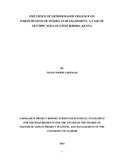| dc.description.abstract | The purpose of this study was to establish the effects of gender based violence on participation of women in development in Olympic Sub-Location, Kibera. The study was guided by the following objectives: to assess the extent to which health concerns affect participation of women in development, to establish how economic status affects participation of women in development, to determine how family break-ups affect participation of women in development, to examine how fundamental rights affect participation of women in development. The target population for the study included women and the area chief of Olympic Sub-Location, Kibera. The study utilized a descriptive research design. Simple random sampling and purposive sampling were used to collect data from the women and the area chief respectively. The sample size for the study was 160 respondents. This sample size was based on the 10% rule. Interview schedule and questionnaire were used as instruments of data collection. The questionnaires were closed ended. Content validity was used to establish the appropriateness of the instruments while half-split method was used to establish reliability. Quantitative data from the field was analyzed using SPSS (Statistical Package for Social Sciences) Version 17.0. The analyzed data was presented in the form of tables using frequencies and percentages. The study found out that health concerns stress and physical injuries included, were the major issue affecting participation of women in development. Low economic status of women especially in low income areas was another influencer due to the effect of low productivity. Moreover, family break-ups affected participation in development majorly due to lack of confidence among women that was caused by the high rate of stigmatization. It was established that despite the fact that women were aware of their fundamental rights to participate in development, the rate of participation was still very low due to the effect of patriarchal systems. Finally, from the regression analysis the study analyzed that the four variables had an influence on participation of women in development in Kenya. Among others, the study recommended that awareness needed to be created among community members on the importance of seeking medical attention in the event that gender based violence causes physical or mental harm. The study further proposes that the government should institute a policy that demands 50:50 gender representation in development initiatives rather than the two third gender rules as provided for by the constitution. Moreover, for women to access justice in case they are abused, police should treat gender violence cases seriously. In addition to that, the government should allocate adequate resources to economic empowerment programs so as to cushion the gender based violence victims who may have lost their livelihood. Finally participation of women in decision-making and economic activities is a key part of empowerment and should therefore be promoted. | en_US |

